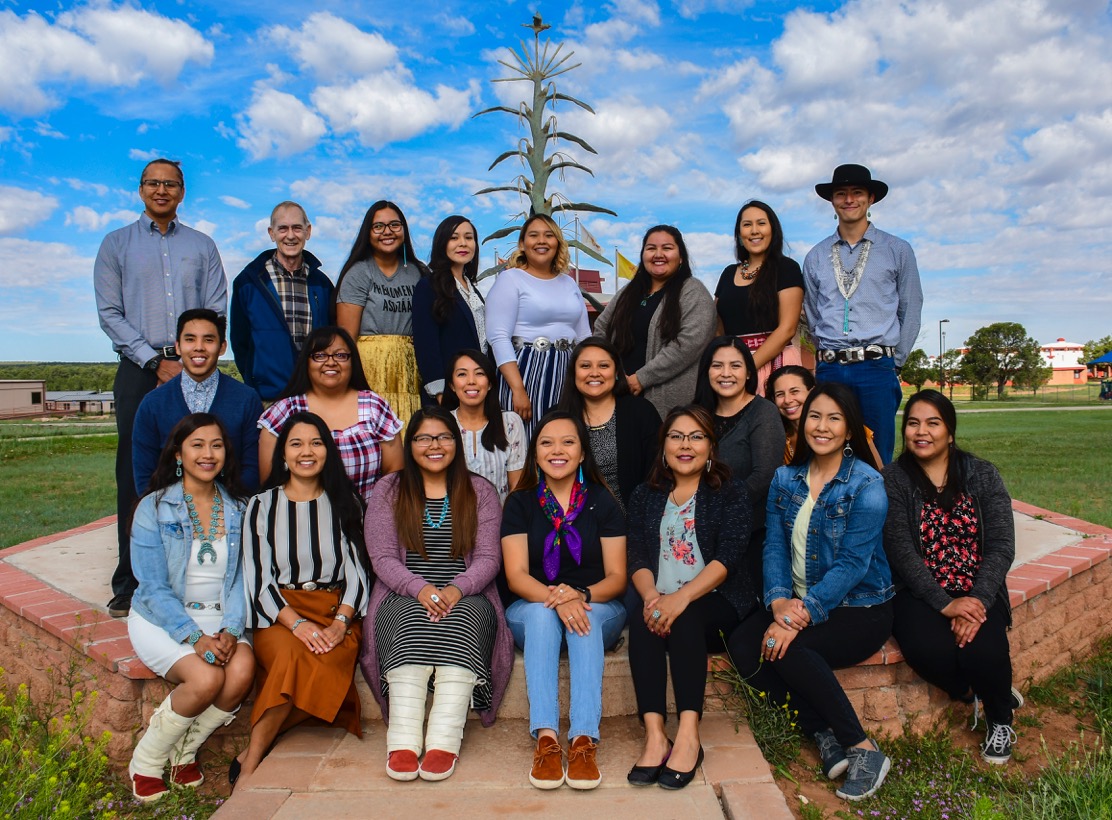Resilient teamwork: partners adapt summer program during COVID

When the COVID-19 pandemic closed businesses and eliminated most summer programs in Arizona last year, a team from Diné College and Northern Arizona University’s Center for Health Equity Research (CHER) quickly pivoted to an online curriculum for Diné students in two longtime summer education programs.
The innovative, dedicated team recently published an article on their experience in Frontiers in Sociology, an open access research publication, titled, “Adapting Summer Education Programs for Navajo Students: Resilient Teamwork.
In the article, they state that the reason for the online summer programs’ success was because the team used key resilience strategies that relied on relationships, holistic approaches and collaboration. In fact, the team members found that the online template could be used as a model pathway to support programs that increase the number of American Indian students who attend college and enter the public health workforce.
The partnership between Diné College and CHER is part of the Navajo Nation Native American Research Center for Health Partnership (NARCH). The study investigators include principal investigators Mark Bauer, Summer Research Enhancement Program (SREP) co-director and professor from Diné College, and Nicolette Teufel-Shone, associate director of CHER and professor in NAU’s Department of Health Sciences; Diné College faculty member and SREP Co-Director Carmella Kahn; Diné College faculty member Christopher Dickerson; Indigenous Summer Enhancement Program (ISEP) Program Director Heather Dreifuss; SREP Practicum Director Jamie Wilson, also an NAU research associate; Amber-Rose Waters, Diné College project coordinator; and Marissa Tutt, Kelly McCue, and Kalvina Belin, CHER research coordinators.
Purpose of ISEP and SREP programs
The Navajo NARCH Partnership coordinates a one-week, high school ISEP program and accepts about 15 students per year. In addition, the program provides a 10-week SREP, designed for public health undergraduate students, which also accepts about 15 students per year. Both programs provide supportive environments for developing strong bicultural approaches in public health and health research.
According to Dreifuss, ISEP is based on the SREP model and provides American Indian high school students an opportunity to experience a college setting, learn about health professions, and meet local public health professionals on the Navajo Nation.
Prior to the pandemic closures, SREP students participated in three weeks of classroom instruction on Diné College’s Tsaile, Arizona, campus. They then attended six-week, hands-on internships with different agencies and mentors that provide students with practical experience in data collection and analysis in a health-related program.
Online program changes and results
For both ISEP and SREP, the leadership team overcame the physical distance by reinforcing social connections. They emphasized the importance of relationships in Diné culture and designed the online program to build a connection between students and the instructional teams through online social activities.
The team developed activities that recognized students’ needs to be playful, exercise, pray, and learn and encouraged students to lead their peers.
“We wanted to create a space for students and staff to connect on a personal level, so we incorporated many icebreakers and other activities like talking circles into our schedule,” Wilson said. “Carving out the time to get to know everyone was important for our mental health and well-being. It also helped the students connect with each other, which was nice because we have a lot of group projects in ISEP and SREP.”
To stimulate the learning experience, the team incorporated creative techniques to keep students engaged and connected, to create a positive experience firmly grounded in resilience strategies and to counter potential psychological distress.
“Our 2020 SREP student cohort came from many backgrounds and faced different life situations, including living in remote areas with poor internet, being a single parent, or facing personal or family emergencies due to COVID-19,” Kahn said. “The biggest lesson we learned over the summer was the need for flexibility and having compassion for not just our students but our staff as well.”
Having only three months to reimagine the program, the team modified SREP so that students were able to maintain peer and instructional relationships.
As in previous years, students were trained in digital storytelling during the five weeks and completed their digital stories with weekly feedback from the instructors. They also still completed data analysis and gave final presentations on the last week online.
“We did our best to manage social disconnectedness and mental and emotional stress,” Kahn said. “Overall, our teamwork approach of encouraging positivity, listening to student needs, and communicating with each other helped us navigate the most difficult moments of the program. In the end, we knew we wanted to offer SREP despite the challenges that came from the pandemic.”
The leadership team adapted SREP site practicums to support students in conducting their own research on COVID-19 topics affecting the Navajo Nation. To participate in practicums, SREP students completed an online training program to become certified contact tracers, to gain compliance with the Health Insurance Portability and Accountability Act (HIPAA) through Indian Health Services (IHS), and other webinars.
To address technology challenges, NARCH provided laptops, iPads, and internet hotspots to select SREP and ISEP faculty and students who needed them.
ISEP and SREP student surveys
The team surveyed both ISEP and SREP students at the end of the programs asking about their experience. Students consistently reported that the programs managed to maintain their reputation of academic rigor and relational strengths they had built over the years.
The team identified technology, social connectedness, student engagement, and practicum research experience as challenges in the online program experience.
“Public health is about adapting to the circumstance by addressing challenges and leveraging resources,” Teufel-Shone said. “Through their willingness to participate in these online programs, ISEP and SREP students experienced public health professionals in action, delivering high quality education to students across the Navajo Nation.”